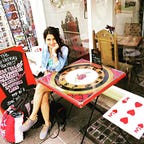My journey of becoming a software engineer at the BBC — Empowerment
This article was published at the BBC Ariel on 18.12.2020 | By Sutveer Kaur
I’m Sura Karnawi, a Software Engineer. I gave birth during the first lockdown and returned to work almost a year afer originally starting. It has not been an easy journey to the BBC but definitely worth it…
In 2006, I fled my home in Iraq. I was surrounded by violence, oppression, and a sectarian and religious fundamentalism that swept the country. This lead to a deterioration in many aspects including in women’s rights. It was traumatizing; I oen felt scared and confused, yet I stayed strong and true to myself with the beacon being my family’s love and support.
My father taught me never to compromise values even if that means dealing with tough consequences, and my mother raised me to be tolerant and forgiving when anger and resentment were prevailing in my society.
From an early age, I had to learn the skill of being adaptive and to always turn adversity into opportunity. I focused on education and art. I endured many days without electricity and I had to study under candlelight.
I did a lot of drawing to help me dream about a peaceful life. I always had an urge to bring about change that has an impact on the status quo. I frequently went through emotional turmoil, and art was a form of therapy for me.
Gender inequality
Growing up in a patriarchal society raised my awareness of deeply rooted issues of gender inequality. Yet aer living and working in Canada, US and the UK, I realised that those issues are endemic in many sectors of western societies as well.
The technology sector is still very male-dominated, which can discourage many women from joining a career in this area for fear of not fitting in. Resolving this issue isn’t just about having a team that looks diverse, it’s about being able to recognize the perspectives that are missing. Following my experiences, I feel obligated to do my part to help fill that gap.
I joined the BBC in September last year as a Soware Engineer with account front-end team. We develop the pan-BBC authentication and authorisation applications, which are the gateway to personalisation for other product teams. When I applied, I was aer personal and career growth and I was hopeful to the idea of contributing to the public service work the BBC does.
Balancing personal life and career as a working mother in STEM
During the interview process, I found out that I was pregnant. My initial thought was to withdraw my application and compromise my career growth: I just didn’t know any other women who had taken on a new job whilst being pregnant at the same time. It seemed like taking a big chance.
But I believed we as women shouldn’t have to choose between career growth and raising family. So I decided to carry on with the application and to share the pregnancy news with the team so there was awareness about my situation and I was offered the job. The team were really supportive about my situation and I felt like I needn’t have worried about the impact on my career.
It was very difficult to settle in at first knowing my circumstances, but I needed to be resilient. It quickly became clear that I had joined a team that valued trust and support between team members. Not only are there many channels for communications and technical support: pair programming, code reviews, and team learning, but also support for a positive work life balance with remote working and flexible hours part of the team’s culture.
This positive ethos made me feel empowered to do the job and I grew in confidence. Joining BBC WiStem gave me the opportunity to meet a lot of inspiring women who supported each other which helped me to settle in as well.
Just six months aer starting, I went on maternity leave. My team threw a fantastic, surprise baby shower for me, which I thought was going to be a workshop.
I gave birth during the first lockdown to a beautiful little boy and returned to work almost a year aer originally starting. I’ve been back from maternity leave for seven weeks now and it can be a challenge, especially during the current pandemic. My partner and I had to think outside the box to find solutions for our childcare arrangements. With all the uncertainty and restrictions, we still have to think on our feet but the reassurance and flexibility I was offered by my team have made this much easier.
Besides my desire to grow in the technology industry, I have a vision that I can be part of something bigger than me. I hope to contribute towards building an inclusive culture that reflects, empowers, and utilizes different perspectives that will have an impact on what we do and what we create.
I always find resilience by moving towards a goal which is beyond myself. In my journey I find that support has been an important factor of being able to achieve my dreams even if it sounds difficult at first. I believe that if I share my perspective and give a chance to others to be part of that journey then we can be part of the solution together.
